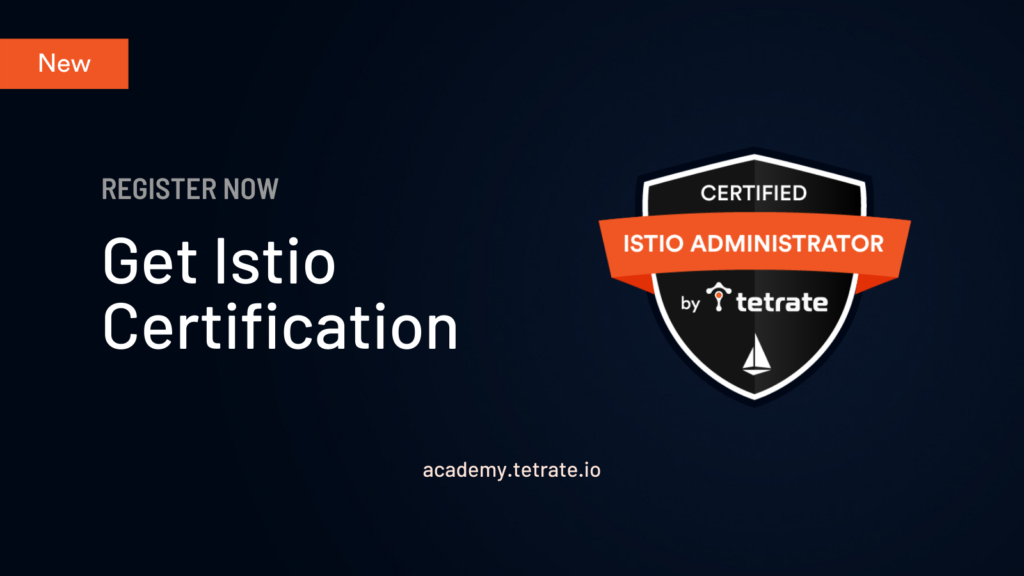How Istio certification can give you a cloud-native edge
Certifications go beyond helping you showcase your skills to potential employers. They are a great tool to keep learning new tech

Certifications go beyond helping you showcase your skills to potential employers. They are a great tool to keep learning new tech. This post looks at how certifications such as Istio certification and Kubernetes certification can help you in your journey.
Over the past few years, the need to adopt more modern, cloud-native architectures and technologies has grown rapidly. And building skills in this field can give you a leg up in your career.
The technology industry is awash in certifications. There are two primary advantages to pursuing them.
Opportunity: employers value certifications
Firstly, employers increasingly value certifications– more than they have in the past. True, employers value real work experience even more, but certifications are coming into their own as a way to develop and validate professional skills.
A 2021 Linux Foundation report on critical skills, hiring trends, and education found that 72% of employers were more likely to hire a candidate with relevant certifications, up from only 48% in 2018. The report also said that 88% of employers were willing to pay for their employees’ training and certifications, up from 55% in 2018. This trend shows how certifications are growing in value.
One reason for this is that, especially in the field of building modern, cloud-native applications, tests such as the CKA and CKS have paved the path as practical exams that test real, technical problem-solving abilities, not just one’s knowledge of theory. As a result, employers in this domain see greater value as the certifications credibly signal to them that the candidate has hands-on technical skills. The Certified Istio Administrator by Tetrate (CIAT) program is a good example of a certification that uses this approach. It tests you on your understanding of the Istio service mesh, how to use it to solve the problems it addresses, and how to troubleshoot common problems that you may run into when deploying or configuring Istio.
Growth: a tool for your personal learning
Secondly and more importantly, certifications help you build your knowledge and skills in your field and in adjacent or related fields.
Fifteen years ago, Carol Dweck taught us all about nurturing a growth mindset. I have come to look at certifications through the lens of a similar concept: the beginner’s mind – a mindset where you approach everything not as a know-it-all but with openness and curiosity to see if there’s something new to be learned from each experience. Certifications are a tool to nurture continuous learning.
Even if your experience is so extensive that you don’t need certifications to show potential employers, you can still gain from the process of the conscious, structured learning that you get from preparing for the tests.
It is time to think of certifications differently — they are there not simply to prove to others that you know your stuff and to lend you credibility, but also to help you learn and grow and broaden your knowledge.
It will help prove to yourself that you know your tech.
In the absence of such exams, learning new technologies becomes challenging because we need a structure to our learning. We get stuck on minutiae and miss out on the woods. When faced with exams, we proactively go looking for content to help us pass. This provides that structure to our learning.
Pre-commit to your learning
You can also use certifications as a tool to help you pre-commit to learning and thereby force you to learn. The psychologist and behavioral economist Dan Ariely studied using precommitment as a way to get things done. His research shows that self-imposed deadlines do help in focussing your efforts.
Precommitment as a tool has been studied since at least the 1950s. Back then it was understood as a negotiating tool. By visibly limiting your own options, you could limit the options of your counterpart. The social theorist Jon Elster studied how precommitment could be used to impose self-discipline. He called it the Ulysses problem, referring to Odysseus commanding his sailors to bind him to the mast before sailing past the Sirens. Odysseus foresaw his weakness and planned on how to overcome it. Limiting your options in advance can help you overcome your inertia. You can use this technique by signing up for your certification exams in advance, even if you think you are not fully ready. This constraint that you impose on yourself can help focus your efforts.
Selecting the right certification program
One good thing about the tech industry is the number of certification programs and exams out there. If you know what you want to learn and achieve, then they can give you a structured, systematic path to learn new topics.
That said, not all certifications are the same. Some certification tests require you to simply regurgitate memorized facts. These will really not teach you much. If you do learn something, you will forget it soon. You will want to find the right certification programs that align with your goals, but the programs that helped me the most in the field of cloud-native technology were the Certified Kubernetes Administrator (CKA) and the Certified Istio Administrator by Tetrate (CIAT).


Both of these tests need you to quickly solve problems using the command-line interface. These are open-documentation exams, meaning that you can keep a browser tab open to look at documentation while you take the exam. These exams test you on a much deeper understanding of the technology. They are difficult to pass and are therefore valued more by employers.
The Istio certification and resources
The Istio certification exam, launched in May 2020, gives you problems to solve and tests you on how quickly you can figure out what the problem is and how to solve the problem so you need to understand Istio really well. It is useful to have experimented with the technology.
Because this exam is so challenging, you get a practice test and two shots at passing the actual certification exam when you sign up. Tetrate Academy also includes a 3-hour video course called Learn Istio Fundamentals that covers all the topics you will need and is a great starting point in your learning. After this, it’s useful to study the Istio documentation and experiment with the Istio examples.
While you don’t need to know the internals of Envoy for your Istio certification, your next port of call, after Istio, can be Envoy. Tetrate Academy has a brand new Envoy Fundamentals course that is worth doing. Good luck on your journey of learning!
Additional resources
- Tetrate Academy
- Certified Istio Administrator exam
- Free Istio Fundamentals course
- Free Envoy Fundamentals course
- Istio weekly: How to become a certificate Istio expert?
This guest blog post was written by Vijay Nadkarni.










